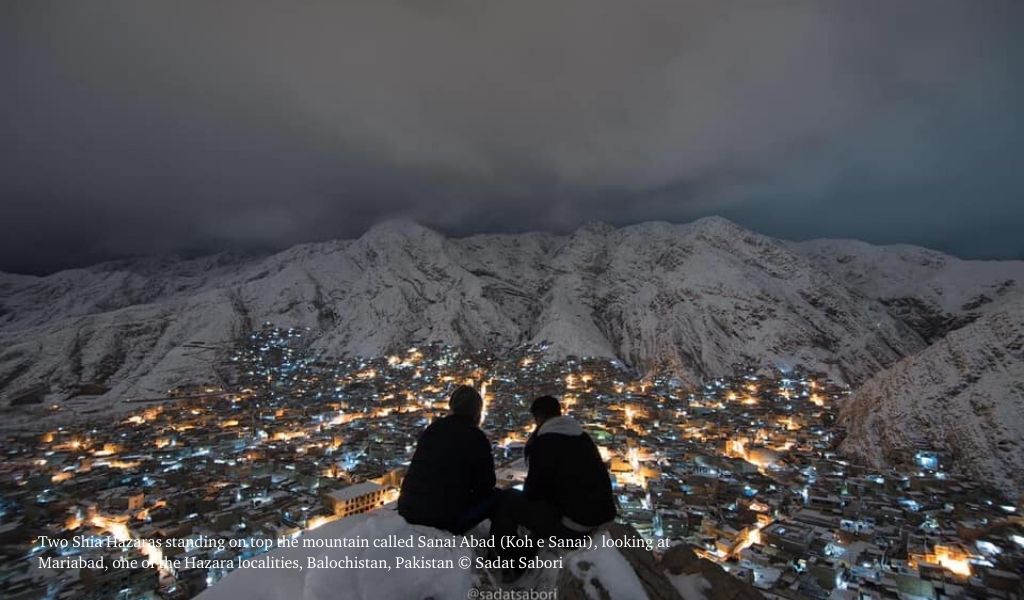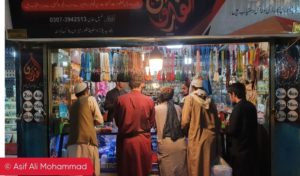“These Hazaras go to Iran and bring viruses to Pakistan”, was the accusation made in a WhatsApp conversation which recently went viral across WhatsApp groups in Quetta, Pakistan. In it, two people can be heard cursing the Hazara Shias as potential transmitters of covid-19. One of the speakers, who was addressed as doctor sahib, warned that Hazara Shias could infect others, and said he was going to calling all his friends to warn them about this threat. Towards the end of the recording, he gives the instruction, if Hazaras come to the office, “tell them it’s closed”.

Two Shia Hazaras standing on top the mountain called Sanai Abad (Koh e Sanai), in Balochistan, Pakistan. Credit. Sadat Sabori
It all started when covid-19 hit Iran end of February and the country witnessed a spike in the number of cases in the holy cities of Qom and Mashhad. Since many Pakistanis regularly cross into Iran – Shia pilgrims as well as traders and tourists – Pakistan closed its borders, freezing all cross-border movement, without giving much thought to Pakistanis who would be stranded in Iran as a result. Consequently, as Adnan Aamir, a journalist from Balochistan has reported, thousands of Shia pilgrims had to camp on the Iranian side of the Taftan border. When the situation in Iran worsened and its government faced backlash for not doing anything for the stranded Pakistanis, the border was re-opened to allow them to return home.
Shia pilgrims quarantined (but others were not)
The provincial government of Balochistan, which shares the border with Iran, established quarantine camps for the over 4,000 returning Shia pilgrims. But the condition in camps was not liveable. According to one report, there were no bathrooms, towels and blankets. One pilgrim compared the camp to a prison.
With Balochistan being one of the most underdeveloped and impoverished provinces in Pakistan, this comes as no surprise. Militarised and politically excluded, its rich natural resources, worth $1 trillion, are extracted with no re-investment in the province’s infrastructure, including health, employment, education and welfare. According to one estimate, Balochistan has the highest mortality rate in Pakistan. Small wonder that quarantining over 4,000 people would prove an uphill task for the provincial government.
The quarantine camps, where there were no proper tests and those with symptoms were kept cheek by jowl with those without, were disbanded and the pilgrims were sent home. Then begun, however, a new campaign against the Shia minority, already a persecuted group in the past.
Hazara Shia community targeted by covid confinement measures
In Balochistan, measures specifically targeting and restricting the movements of Hazara Shia began to be announced by a number of public authorities, prior to any formal overall lockdown. Notifications by the Inspector General of Police, Balochistan, sent members of Shia Hazara community “on leave to prevent the outbreak of covid-19” while the Water and Sanitation Authority (WASA) stated that “Employees belonging to Hazara tribe and residing in Marriabad and Hazara Town should be restricted to their areas”. Finally, the Chief Secretary, the most senior administrative authority in Balochistan, announced that Quetta will be cordoned off from rest of the province and Hazara localities within it will be cordoned off from the rest of Quetta.
There are also many cases of targeted discrimination which are not being publicly reported. Mohammad Aman, a prominent activist from the Hazara community, informed us that in some institutions and offices, employees belonging to the community were forced to go on leave, whilst their non-Shia colleagues continued to go to work.
He said, “Places like Civil Hospital and The State Bank of Pakistan have unofficially asked their employees belonging to the Hazara community, including doctors, not to come to work.” He added, “we don’t know the exact level of discrimination in Shia Hazara localities. There could be more incidents which are yet to be reported”.
Shia scapegoating even at the highest echelons of Government
Two senior federal government ministers, both Shia, have been singled out for exacerbating the spread of covid-19, as part of an organised campaign.
Special Assistant to the Prime Minister on Overseas Pakistanis and Human Resource Development, Sayed Zulfikar Abbas Bukhari, a Shia, was accused of using his influence to let pilgrims enter Pakistan, an accusation which was subsequently proved wrong following an internal inquiry.
Another senior Shia Federal Minister, Syed Ali Haider Zaidi, was blamed when Ahmad Ludhyanvi, chairman of Ahl-e-Sunnah Wal Jamat (ASWJ), a notoriously anti-Shia organisation, tweeted, “Zulfi Bukhari is not alone. Ali Zaidi is also complicit in the spread of the virus”. By 1-2 April, a campaign on Twitter was trending in which the virus was being referred to as the ‘Shia virus’.
Hazara Shia singled out as potential covid-19 transmitters (but what about other travellers?)
From the outset of the outbreak, both federal and provincial governments appeared to hold a preconceived notion that Shias are the main carrier of covid-19. If not, why then were the 1,704 non-pilgrim returnees from Iran not quarantined as well, and allowed to travel home with only minor temperature screening taking place?
Similarly, Pakistani citizens returning from the UK, US and other European countries which were highly affected by covid-19 were allowed entry with no quarantine required, and, in some cases, not even having their temperatures checked. These selective measures point towards the existing mindset where a specific group is classified as a potential transmitter of the virus.
Sajjad Changezi, a Shia Hazara activist and writer, recently wrote that though Hazaras only constituted a tiny proportion of Shia and non-Shia returnees from Iran, the government’s disproportionate response points to the whole Hazara community as being the sole carrier of the virus. Changezi rightly stresses that the issue is not quarantining; it’s the way government racially profiled and stigmatised the Hazaras.
How will this specific targeting of Hazaras affect an already persecuted community?
Aman prudently apprised that Hazaras will continue to suffer the backlash in the future.
“When those Hazara employees will resume their jobs in the police, banks, and hospitals, will their colleagues see them from the same gaze? What assurance do we have that Hazaras won’t be blamed for the outbreak and the lives we have lost during covid-19?”
Indeed, these are the serious concerns which both federal and provincial governments didn’t contemplate when they were cornering Hazaras. This pandemic like the previous ones shall pass. However, will the stigma now associated with the community fade away in the post-covid-19 settings?
Jaffer A. Mirza is a researcher and columnist, and is associated with the Coalition for Religious Equality and Inclusive Development (CREID), led by IDS. He tweets at @jafferamirza..



